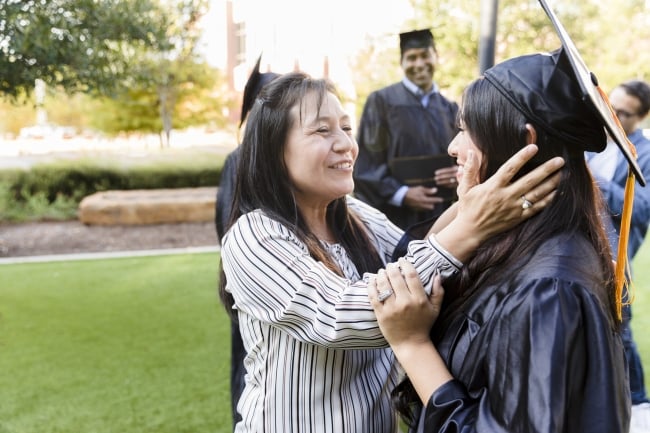You have /5 articles left.
Sign up for a free account or log in.

Higher education leaders can support first-generation retention and success through intentional communication and outreach to learners’ families.
SDI Productions/E+/Getty Images
First-generation students continue to make up a large portion of learners in U.S. colleges and universities. To promote academic success and retention, institutions can prioritize intentional communication and programs engaging family members.
In the first-generation student group at Saint Mary’s College in Indiana, “one of the biggest conversations that we see year-to-year [among students] is conversations on family and school balance,” says Christin Kloski, director of the office for student equity.
“First-gen students, in particular, are often the glue for their family, because many of them earn extra income to help their family or they help pick up siblings from school or even help with homework,” explains Michelle Thomas, director of Passport, Ryan Family Scholars and Student Organizations at Miami University in Ohio. Thomas was also a first-generation student herself. “When we remove first-gen students from their families to go to college, we take away a huge anchor for that family.”
Involving first-gen families in the college experience can help. Inside Higher Ed compiled three strategies institutions are using.
Survey Says
A summer 2023 Student Voice survey from Inside Higher Ed and College Pulse found 86 percent of respondents who completed a specialized summer bridge or orientation rate their overall orientation experience as good or excellent, 13 percentage points higher than their peers who did not participate in a special program.
Approximately one third of first-generation students say it’s important to include specialized programs and events for first-gen learners during orientation, as well.
- First-gen orientation
The Farmer School of Business at Miami University created a presemester boot camp for first-generation students to help build community early and involve family members in the conversation. The boot camp is one portion of the Passport program, a four-year student success initiative for first-generation business students.
During the boot camp, students learn how to build resiliency, identify their strengths and navigate college, including: identifying potential roommate challenges, making appointments with faculty and staff for help, emailing professionally, and finding academic support.
The boot camp also gives parents a chance to meet students’ support network professionals, including academic advisers, faculty and campus leaders, in a comfortable way.
“Building a community and a team early for first-gen students signals that the school sees them and wants them to be successful,” Thomas says.
- Parent liaison
One problem for first-generation students is they may not know where to turn for academic help, and that can extend to their family members. To resolve this, institutions can assign a designated liaison or success coach to address questions and concerns of first-gen families.
The University of Dayton in Ohio has two success professionals for its Flyer Promise Scholars, a first-generation and low-income scholarship program. Beverly Jenkins and Kathleen Henderson have worked at the university for over four decades, providing a large swath of institutional knowledge but also personal guidance for the 140 program participants.
At Miami U, Thomas shares her cellphone number with Passport students and parents for any and all questions. After the boot camp and meeting staff, “families … feel less worried and stressed about their student because they now have a point of contact to ask questions without judgment,” Thomas says.
Thomas also makes herself available after hours, accommodating both student and parent schedules.
- Peer connection and mentorship
Many first-generation students can feel alone moving through college because there’s no one in their family they can turn to when problems arise. Creating opportunities for learners to engage with their classmates who feel the same way or to learn from older peers can promote belonging, which is critical to retention and academic success.
“If something is not right back home, [a student] could be literally one phone call away from things falling apart,” Thomas says.
Saint Mary’s recognizes the cornerstone role families can play in the first-generation experience and addressed student communication and expectations in a five-part video series for incoming students.
Pacific Oaks College in California created a bilingual podcast series that highlights stories of students and college employees who have successfully transitioned into higher education to provide role models for current learners.
Get more content like this directly to your inbox every weekday morning. Subscribe here.




